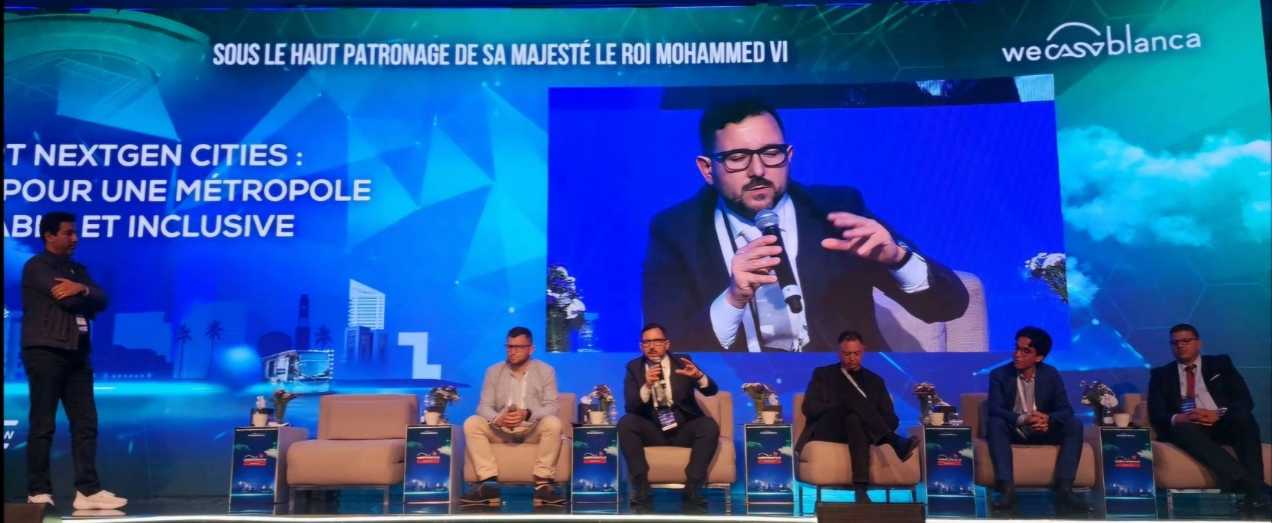Paving the way for resilient, inclusive, and Tech-Driven urban futures
I had the opportunity to participate and contribute my experience to a national meeting that left me with fond memories and a desire to look to the future with optimism and pragmatism.
The Smart Cities Morocco 2025 Roadshow was an important moment for Morocco on its path towards sustainable urban, health, and mobile development. Organized in partnership with Mohammed VI Polytechnic University (UM6P), the event brought together stakeholders from various sectors to imagine and co-create the future of African cities.
Casablanca: Launching the Vision
The roadshow commenced in Casablanca, focusing on the city’s role as a hub for smart urban solutions. Discussions centered around smart mobility, digital infrastructure, and citizen engagement, setting the stage for a national dialogue on urban innovation.

Urban Mobility: Building Efficient and Green Transport Networks
One of the central themes of the Casablanca sessions was urban mobility — a foundational challenge for any city aspiring to become smart and sustainable. Presentations and panels explored:
- The integration of AI-powered traffic management systems to reduce congestion and carbon emissions.
- Deployment of multi-modal transport platforms combining public transit, e-bikes, and ride-sharing services.
- Use of real-time data analytics to optimize bus routes, parking availability, and pedestrian flows.
Startups and municipal leaders showcased pilot projects aiming to make mobility not just faster and smarter — but also more equitable and environmentally responsible. These initiatives echoed a clear message: Urban Mobility is not a luxury; it’s a right.
Benguerir: Youth, Sustainability, and Visionary Leadership
The final stop in Benguerir, at UM6P’s state-of-the-art campus, focused on three strategic pillars: Sustainability Excellence, Youth Empowerment, and Innovation Foundation. The event featured keynote speeches, panel discussions, and partnership signings, emphasizing AI for green communities and unlocking funds for youth employment.
Benguerir, brought the spotlight to UM6P’s high-tech campus, where three central pillars took center stage:
- Sustainability Excellence
- Youth Empowerment
- Innovation as Foundation
Thought-provoking panels and strategic partnerships took place, underlining AI’s potential in creating green, future-proof communities and driving youth-led solutions for employment and entrepreneurship.
Health Technology: Smart Cities for Healthier Living
One standout focus in Benguerir was the role of health technology in urban development. Experts explored how smart cities can enhance public health outcomes through:
- Telemedicine infrastructure to expand access in underserved communities.
- IoT-connected health devices for real-time patient monitoring and emergency response.
- Smart environmental sensors to monitor air quality, noise, and water safety — key contributors to urban well-being.
The roadshow reinforced that urban innovation must serve human health, not just hardware. Healthtech was presented not only as a vertical industry but as a horizontal foundation of truly livable smart cities.

A Roadmap for Resilient and Inclusive Cities
The roadshow underscored Morocco’s commitment to building resilient and inclusive urban environments. Key takeaways included:
- Community-Centric Development: Emphasizing the importance of involving citizens in the planning and implementation of smart city initiatives to ensure they meet local needs.
- Technological Integration: Leveraging technologies like AI and IoT to enhance urban services, improve infrastructure, and promote sustainable practices.
- Youth Empowerment: Recognizing the role of young people as catalysts for change, with initiatives aimed at fostering innovation and entrepreneurship among the youth.
- Sustainability Focus: Prioritizing environmental considerations in urban planning to create cities that are not only smart but also sustainable.
Aawatif Hayar: Steering the Vision
Professor Dr. Aawatif Hayar, serving as the Scientific Chair of the Smart Cities Morocco Roadshow, played a pivotal role in shaping the event’s vision and execution. With a distinguished background as a professor at Hassan II University and former Minister of Solidarity, Social Integration, and the Family, Prof. Hayar brought a wealth of experience in sustainable urban development and social inclusion. Her leadership ensured that the roadshow not only highlighted technological advancements but also emphasized the importance of community engagement and inclusivity in building smart cities.

A Special Thanks: Mohammed Khalil
This initiative would not have reached such heights without the dedication and leadership of Prof. Dr. Mohammed Khalil. His commitment to organizing a multidimensional, high-impact event one that bridges academic excellence, governmental vision, and technological progress has been instrumental in making the Smart Cities Morocco Roadshow 2025 a success. His collaborative approach, passion for innovation, and strategic insight helped elevate this roadshow from a series of events into a national roadmap for the future of Moroccan urbanism.





Looking Ahead
As Morocco prepares to co-host the 2030 FIFA World Cup, initiatives like the Smart Cities Morocco Roadshow are crucial in building resilient, inclusive, and technologically advanced cities. The collaborative efforts witnessed during the roadshow set a precedent for future urban development projects, ensuring that Morocco remains at the forefront of smart city innovation in Africa.
Thanks to leaders like Dr. Khalil, Prof. Hayar, UM6P and partner institutions, Morocco is not just catching up with global smart city trends, it’s helping define them.
